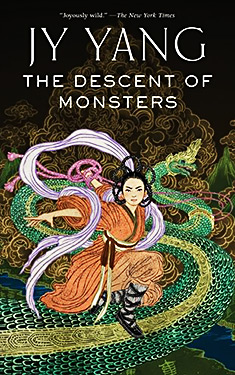Neon Yang
Completed 10/12/2022, Reviewed 10/12/2022
3 stars
The third entry in the Tensorate series was another good story, but again, not as great as the first. This one was basically a murder mystery. However, it was about the slaughter of a whole institute of people and the cover-up that ensued. It did keep me on the edge of my seat, mostly because of the narrator, a police investigator who figures out that the government is hiding a big dark secret. Most of the main characters are back, but in smaller roles. It’s all about the investigator and how she deals with conspiracy to hide the real reason for the institute and the cause of the murders.
Investigator Chuwan Sariman is called to resolve the murders of a large number of people in a secret institute that conducted strange experiments, about which she can get no information. Even the interviews with the two suspects, our Akeha and Rider, have deleted content. The government is pushing Chuwan to close the case, but the whole story is messy. The more she uncovers, the greater the conspiracy seems. Finally she quits the force and tries to figure out the real purpose of the institute and real cause of all the deaths. Of course, this leads her to our main characters from the first two books.
What I liked best about this book was the form. It’s epistolary, that is, told in letters, memos, and journal entries. Almost all the content is narrated by Chuwan, with the exception of a few of the memos she receives from her superiors. There’s also an interview with Rider that is splendidly told. I was impressed by Yang’s ability to keep the story going without it seeming like exposition. What really helped were Chuwan’s journal entries where she gets very real about her disgust for the police force and the Tensorate government.
The world building is pretty interesting in this book, particularly when the real purpose of the institute is revealed. Despite the sense of the setting being medieval China, there’s a lot of technology, from machines and from magic. There are guns, hovercrafts, and mechanisms that are almost steampunkish. I’ve seen references to this being silpunk, which I’m guessing means silk punk. Anyway, it kept me on my toes whenever I would lapse into thinking it was all horses and kimonos.
I also really liked the writing. Yang really got into the meat of Chuwan’s dilemma making me feel her frustrations as the case reached its premature end. I definitely could empathize with her. And the writing was very real and immediate, not full of flowery prose.
I give this book three stars out of five. Despite this rating of “good”, I did enjoy it and am glad I’m reading the series. As a whole, I think it exceeds the average of the ratings of each individual book. We’ll see if this holds true through the fourth installment.

No comments:
Post a Comment